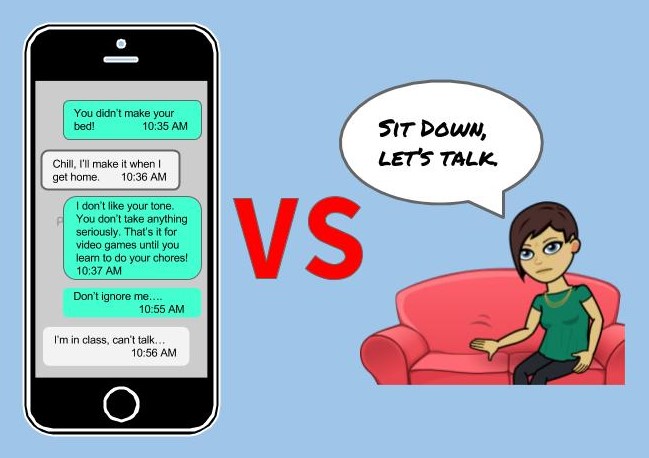Parenting in the Age of Smartphones
 At the beach the other day, I ended up in a conversation with a tourist — let’s call him Andrew — who asked me what I did for work. After telling him I owned a school, he mentioned that he’d run a summer camp for 25 years, but that he’d recently given it up. When I asked him what happened, he simply said: “Smartphones happened.”
At the beach the other day, I ended up in a conversation with a tourist — let’s call him Andrew — who asked me what I did for work. After telling him I owned a school, he mentioned that he’d run a summer camp for 25 years, but that he’d recently given it up. When I asked him what happened, he simply said: “Smartphones happened.”
As we chatted, he explained that one of the great things about summer camp has always been that kids develop their independence and need to make decisions on their own. In the past, a child would look at a t-shirt and ask Andrew, “Do you think I should buy this for my mom?” and he would give them space to make up their own mind by asking, “Well, what do you think? Do you have enough money? Do you think she’d like it? You know your mom. Think about it and decide what’s best.”
But in more recent years, everything changed. Now, all a child has to do is snap a picture of the t-shirt, send it to their mom, and ask if they should buy it for her. The response comes immediately. No need to think for themselves, no need to weigh up the pros and cons and take a decision. Mom makes the decision for them.
Realizing that the benefits of going to summer camp were being lost with the advent of the smartphone and 24/7 connectedness with parents, Andrew lost heart and decided to give it up. And I completely understand his frustration.
On the other hand, as a parent, I know how hard it is to stand back and let your children struggle with tough decisions, make mistakes, and learn from them. In this time of instant communication, giving our children the space they need to become independent is even harder — and yet, it’s so necessary. So how can we foster independence in an age of constant communication? Here are a few tips for parents to make the balancing act easier:
Learn to say, “What do you think?”
When children text us to ask a question, we don’t have to give an immediate answer or solve the problem for them. Throwing the question back at them makes them think things through for themselves, while also letting them know that we trust them to make their own decisions.
Don’t answer messages from them when they’re at school.
Set rules with your children. Let them know that if they’re sick or they have an emergency, they should go to the office and ask to call you. If it’s not important enough to go to the office, it can wait until they come home. If they forgot the materials they needed to give their presentation, they’ll have to explain the situation to the teacher and pay the consequences. Don’t save them. This is how they learn.
Don’t text them when they’re at school or at an extracurricular activity.
Just don’t. Give them space. If you get a message from a teacher about the homework they didn’t do, wait till they get home to discuss it. If you’re angry because they didn’t do their chores, again: wait until they get home to discuss it. Text messages can sound harsh and scary. In a face to face conversation your words may be firm, but you can deliver them with a loving tone of voice and accepting body language. Over and over again teachers observe that when students receive angry text messages from their parents, they get nervous and shut down. When that happens, the learning is over for the day…just the opposite of what parents want.
Following these three simple rules will help your children grow up to become independent adults. Although constantly hovering over our children to save them from tough decisions or emotions may feel like good parenting, it’s not. In the heat of the moment, when we feel angry or frustrated, it can be tempting to shoot off a text message but we need to keep our long term goal in mind. Except for emergencies, put that smartphone away.
Show your children you trust them and they will become trustworthy. Give them space to grow and they will thrive.

Excelente artículo, totalmente de acuerdo!!!… gracias por por compartir estas reflexiones y siemlre tener un buen consejo.
Totalmente de acuerdo!!!!